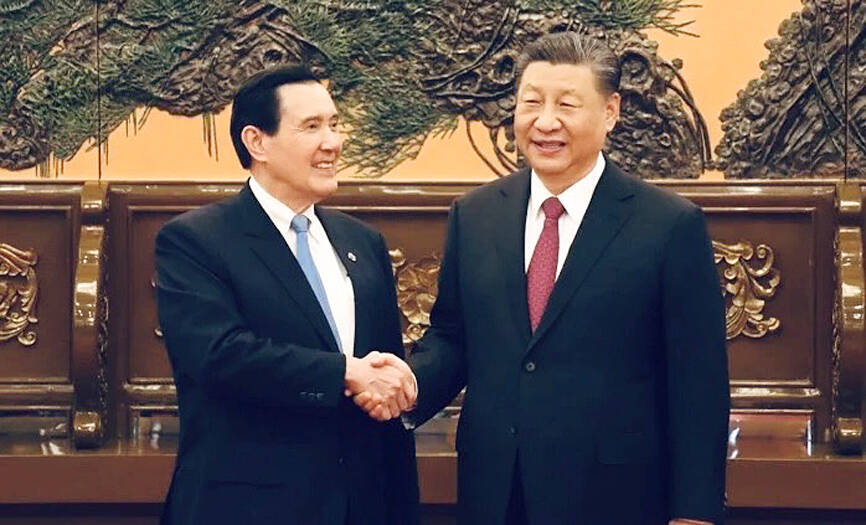Chinese President Xi Jinping (習近平) yesterday met with former president Ma Ying-jeou (馬英九) at the Great Hall of the People in Beijing, with Xi’s opening statement once more emphasizing that people on both sides of the Taiwan Strait are Chinese and that foreign intervention cannot change their inevitable unification.
Xi said that 5,000 years of history of zhonghua minzu (中華民族, ethnic Chinese group) have seen their ancestors move to Taiwan to establish new lives, while also documenting them fighting side-by-side against foreign forces and finally freeing Taiwan.
“Both sides are Chinese,” and there are no issues that cannot be worked through, he said, adding that no force can separate them.

Photo: screenshot from livestream
The youth is the hope of a country and of its people, and young people on both sides of the Strait should find within them the will to be proud of their ancestry and work together to jointly create a prosperous future for zhonghua minzu, he said.
Ma said the young members of his delegation deeply appreciate the enthusiasm of their Chinese hosts, and their experiences over the past few days as their travels around China have brought them closer to their cultural roots.
They have seen China’s development firsthand and felt the bonds that tie the two sides together, he added.
The Republic of China (ROC) and zhonghua minzu had weathered a century of humiliation in the past, but joint efforts across the Taiwan Strait over the past three decades have slowly brought zhonghua minzu back to prominence, he said.
While people on both sides of the Strait live under different governing philosophies, they are both Chinese people and should help one another to revitalize zhonghua minzu, Ma said, adding that this was the ideal he and “Mr Xi” agreed on at their meeting in 2015.
Ma said he hoped both sides would cherish the values and ways of life of their respective societies.
Quoting Chinese writer Lu Xun (魯迅), he said: “Though we suffered tribulations and hardships, we remain brothers; let us greet one another with smiles, and let bygones be bygones (渡盡劫波兄弟在、相逢一笑泯恩仇)” to emphasize that war would be unbearable to zhonghua minzu as a whole.
Ma’s statement yesterday potentially puts a new spin on the so-called “1992 consensus,” as he stated that while both sides in 1992 had verbally expressed their understanding of “one China,” future generations should prioritize public welfare, adhere to the “1992 consensus” and jointly reject Taiwanese independence.
The so-called “1992 consensus,” a term former Mainland Affairs Council chairman Su Chi ( 蘇起 ) in 2006 admitted to making up in 2000, refers to a tacit understanding between the KMT and the Chinese Communist Party (CCP) that both sides of the Strait acknowledge there is “one China,” with each side having its own interpretation of what “China” means.
Ma is in China as part of what he has called a “journey of peace” to calm tensions with Beijing, which has never renounced the use of force to bring Taiwan under its control.
Additional reporting by AFP

The combined effect of the monsoon, the outer rim of Typhoon Fengshen and a low-pressure system is expected to bring significant rainfall this week to various parts of the nation, the Central Weather Administration (CWA) said. The heaviest rain is expected to occur today and tomorrow, with torrential rain expected in Keelung’s north coast, Yilan and the mountainous regions of Taipei and New Taipei City, the CWA said. Rivers could rise rapidly, and residents should stay away from riverbanks and avoid going to the mountains or engaging in water activities, it said. Scattered showers are expected today in central and

COOPERATION: Taiwan is aligning closely with US strategic objectives on various matters, including China’s rare earths restrictions, the Ministry of Foreign Affairs said Taiwan could deal with China’s tightened export controls on rare earth metals by turning to “urban mining,” a researcher said yesterday. Rare earth metals, which are used in semiconductors and other electronic components, could be recovered from industrial or electronic waste to reduce reliance on imports, National Cheng Kung University Department of Resources Engineering professor Lee Cheng-han (李政翰) said. Despite their name, rare earth elements are not actually rare — their abundance in the Earth’s crust is relatively high, but they are dispersed, making extraction and refining energy-intensive and environmentally damaging, he said, adding that many countries have opted to

SUPPLY CHAIN: Taiwan’s advantages in the drone industry include rapid production capacity that is independent of Chinese-made parts, the economic ministry said The Executive Yuan yesterday approved plans to invest NT$44.2 billion (US$1.44 billion) into domestic production of uncrewed aerial vehicles over the next six years, bringing Taiwan’s output value to more than NT$40 billion by 2030 and making the nation Asia’s democratic hub for the drone supply chain. The proposed budget has NT$33.8 billion in new allocations and NT$10.43 billion in existing funds, the Ministry of Economic Affairs said. Under the new development program, the public sector would purchase nearly 100,000 drones, of which 50,898 would be for civil and government use, while 48,750 would be for national defense, it said. The Ministry of

UNITED: The other candidates congratulated Cheng on her win, saying they hoped the new chair could bring the party to victory in the elections next year and in 2028 Former Chinese Nationalist Party (KMT) lawmaker Cheng Li-wun (鄭麗文) yesterday won the party’s chair election with 65,122 votes, or 50.15 percent of the votes. It was the first time Cheng, 55, ran for the top KMT post, and she is the second woman to hold the post of chair, following Hung Hsiu-chu (洪秀柱), who served from 2016 to 2017. Cheng is to succeed incumbent Eric Chu (朱立倫) on Nov. 1 for a four-year term. Cheng said she has spoken with the other five candidates and pledged to maintain party unity, adding that the party would aim to win the elections next year and